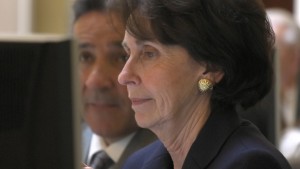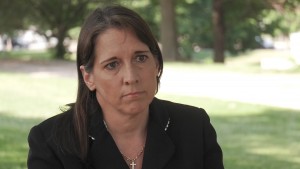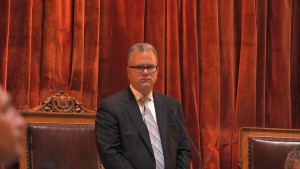The 2016 session of the General Assembly will be remembered, in part, as the year many Rhode Islanders got a tutorial on legislative and community grants — a program that distributes millions of taxpayer dollars annually to non-profit organizations at the whim of legislative leadership, in some cases with little oversight.
 We’ve all witnessed the legislative grants, often a photo op for the local newspaper, complete with lawmaker, recipients and an oversized ceremonial check. And the so-called community grants, which have gone to organizations like Crossroads or Rhode Island Meals on Wheels.
We’ve all witnessed the legislative grants, often a photo op for the local newspaper, complete with lawmaker, recipients and an oversized ceremonial check. And the so-called community grants, which have gone to organizations like Crossroads or Rhode Island Meals on Wheels.
But The Hummel Report found another category of money being appropriated by the General Assembly: departmental grants: taxpayer money allocated to and distributed by various state agencies like the Department of Environmental Management, The Department of Administration or the University of Rhode Island.
 Rep. Patricia Morgan has been a longtime critic of the grant program and says that despite the house speaker’s assertion they are community grants, the departmental grants are really their own entity — because state agencies are being used as a conduit for the money.
Rep. Patricia Morgan has been a longtime critic of the grant program and says that despite the house speaker’s assertion they are community grants, the departmental grants are really their own entity — because state agencies are being used as a conduit for the money.
“That gives the people up here in this building, in the state house, a degree of separation,’’ Morgan said. “What’s the criteria for them to give out this money? What value does it add to the taxpayers and how do you judge that value? What metrics, what performance metrics are you putting on the money? That’s missing in that money.”
 Rep. Karen MacBeth has opposed legislative grants since she was first elected to the Rhode Island House in 2008, submitting a bill during her first term to have them eliminated. She even sent then-Speaker Bill Murphy certified letters trying to personally get on his radar screen with her opposition to the grants.
Rep. Karen MacBeth has opposed legislative grants since she was first elected to the Rhode Island House in 2008, submitting a bill during her first term to have them eliminated. She even sent then-Speaker Bill Murphy certified letters trying to personally get on his radar screen with her opposition to the grants.
MacBeth, who until recently was the chairwoman of the House Oversight Committee, said she talked to Speaker Nicholas Matiello about turning the oversight committee’s focus to the grant program — in part because then-house finance chairman Raymond Gallison was associated with an organization receiving grant money. Gallison abruptly resigned this spring, the target of a federal investigation.
 Matiello told MacBeth grants came under the purview of house finance. Shortly after that, MacBeth switched from being a Democrat to Republican and the speaker removed her as the chairwoman of oversight. MacBeth since decided not to seek a fifth term.
Matiello told MacBeth grants came under the purview of house finance. Shortly after that, MacBeth switched from being a Democrat to Republican and the speaker removed her as the chairwoman of oversight. MacBeth since decided not to seek a fifth term.
Jim Hummel: Were you more concerned about the oversight and accountability of the money or the concept of funding charities that maybe should be raising their own money?
Karen MacBeth: I think both. My own philosophical belief is that we should not be doing that, that’s not our role here. But putting that aside, if it was going to happen, I wasn’t going to be a part of it. But I certainly wanted to see the oversight of it.
The Hummel Report examined the money distributed through URI the past five years. Last year the university was enlisted to distribute nearly three quarters of a million dollars to eight organizations, including more than $28,000 for the Hope High School Scholarship Fund and $5,100 for something called Italian Cultural Heritage; more than $31,000 went to Learning Enhancements for Adult Programs.
We found the Italian Cultural Heritage funds actually go to support Italian Americana, described as a semi-annual historical and cultural journal devoted to the Italian experience in America. The benefit to taxpayers is unclear, but it says URI benefits from the journal’s wide distribution and “any acclaim it receives.”
“When I first heard that there was money going to URI and then URI was supposed to give money to organizations or groups, I think that puts URI in a difficult situation,’’ MacBeth said. “That’s not their job. Their job is to educate our students and this didn’t seem to be part of it.”
The largest URI grant goes to the Polaris Manufacturing Extension Program. The $350,000 grant was justified in a two-page handwritten form that says the mission of the program is to “grow small Rhode Island manufacturers” through bus tours, ‘consortia’ and seminars.
“We don’t see those line items in our budget. So you can be thinking and voting on a budget that says we’re giving $10 million to URI and then underneath it they’re giving money to other places,” MacBeth said.
House Speaker Nicholas Mattiello announced this spring that he was revising the community grant program, reducing it from a total of $11.3 million this year to $6 million next year. The total number of grants has been reduced from 230 to 25, with four pools of money created and distributed by state departments.
The legislative grant program will remain unchanged at $2.2 million, split equally between the house and the senate.
That’s not enough for Rep. Morgan: “My fear is that now they’re saying: ‘All fixed. It’s all fixed.’ Not so fast, it’s not all fixed and I’m afraid the people will fall for it again and say okay, now it’s a line item in the budget. That means nothing. They can add and subtract line items in that budget and nobody will go and do the research and that’s the problem.”
The Hummel Report is a 501 3C non-profit organization that relies, in part, on your donations. If you have a story idea or want make a donation go to www.hummelreport.org, where you can also see the video version of this story. You can mail Jim directly at jim@hummelreport.org.